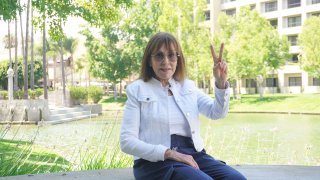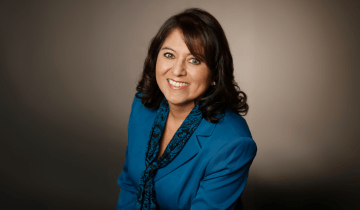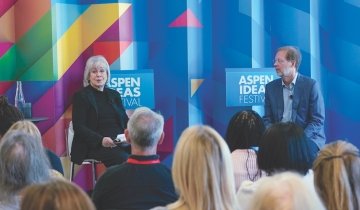After trading the harsh winters of Minnesota for the California sunshine, Sandra Lieberman—armed with a degree in parks, recreation and leisure studies from the University of Minnesota—began working at Camarillo State Hospital in the early 1970s.
It was there that she worked with special needs children for the first time, and it was an experience that changed the course of her life. Part of her role was to take the children out for fun activities, and the excitement of the children sparked something in her. After taking a class at Fairview Developmental Center with a woman who specialized in special education, she immediately knew she wanted to return to school to gain more experience working with special needs children. Soon after, she enrolled in courses at the USC Rossier School of Education, studying special education.
Looking back at her time at USC Rossier, Lieberman fondly remembers Professor Leo Buscaglia ’49, MS ’52 PhD ’63 or “Dr. Love,” as he was known to many. “He required that you meet with him to be in his classes,” Lieberman recalls. She took two classes with him, and his impact on her was profound. “He was extremely passionate about education. He was committed to his students. He wanted to know his students,” she says.
Lieberman also points to the impact of her counselor, Dr.Williams, who helped arrange her student teaching for a location near where she lived in Marina del Rey. “USC sets you up in positive situations,” Lieberman says.
Her time at USC opened doors for her that she couldn’t have imagined. After completing her student teaching, she soon began looking for a full-time role. Her counselor suggested she reach out to Principal Jim Barton at Canyon Hills School in Orange, Calif. The administrator she spoke with told her he was departing for vacation but would respond on his return. But after Principal Barton learned she attended USC Rossier, he called her back immediately and asked her to come in for an interview the next day. She ended up working in education for over 30 years.
“I did spoil my kids in those days,” Lieberman says. She was constantly planning exciting activities for her students. Once, the week before winter break, she took her class to breakfast with Disney characters. Another time, she and her aides took the class to Disneyland during a McDonald’s student ticket giveaway. “The parents bought their tickets and joined us. It was a special, fun day,” Lieberman recalls.
Throughout her teaching career, Lieberman worked with students of all ages, from pre-K to young adults. She points to her time working with a fantastic master teacher as one of the most formative parts of her training. During student teaching, she says, you gain invaluable hands-on experience. "You see lessons that don’t work well, and you see lessons that are super successful.”Making the most of this training, Lieberman says, will help new teachers step into their future classrooms better prepared.
Lieberman also believes that standard education can learn a lot from the practices of special education. “In special education, we do an IEP (individualized education program), so what we’re doing is for the needs of that specific child. If we do more of that with all children, instead of following this [standardized] curriculum, that would really help.”
Special education teachers, in particular, should also not be afraid to get outside help, Lieberman says. During her career, she sought the expertise of psychologists, speech therapists and other specialists to help her provide full wraparound services for her students.
In 2024, with an aim of truly “making a difference in someone’s life,” Lieberman established the Sandy Barry Lieberman MAT Scholarship Fund at USC Rossier. Her generous scholarship gift will support students enrolled in the Master of Arts in Teaching, Special Education Pathway.
To learn more about giving to USC Rossier, please visit rossier.usc.edu/giving or contact Rachel Beal, associate dean for advancement, at bealr@rossier.usc.edu.



